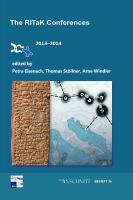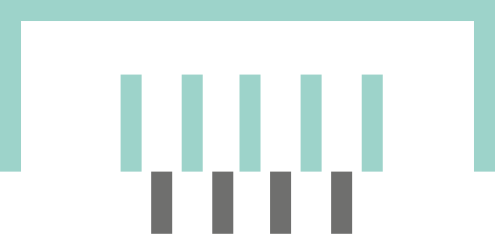The RITaK Conferences. 2013-2014: RITaK 1: Raw Materials, Innovation, Technology of Ancient Cultures - RITaK 1
Schlagworte:
Rohstoffe, Technologietransfer, Wissenstransfer, Innovationen, Ressourcen, Bergbau, Theorie, Reziprozität, Warentausch, Tauschpraktiken, Materialität, Soziolgoie, Ökonomie, Archäometallurgie, Handwerk, Gesellschaften, Bronze, Handel, Münzen, Numismatik, Salz, Silber, WirtschaftsgeschichteÜber dieses Buch
Rohstoffe spielen eine global zentrale Rolle und entscheiden maßgeblich über Wirtschaftskraft und -wachstum moderner Staaten, Konföderationen und Koalitionen. Rohstoffgewinnung und –versorgung sind nicht nur heute treibende Kraft der Weltwirtschaft, sondern haben die Wirtschafts- und Kulturgeschichte der Menschheit geprägt. Zur Bedeutung von mineralischen Rohstoffen in vormodernen Gesellschaften haben Doktorand*innen sowie die Mitglieder der Leibniz-Graduiertenschule „Rohstoffe, Innovation, Technologie alter Kulturen“ (RITaK) – eine Kooperation zwischen dem Deutschen Bergbau-Museum (DBM) und der Ruhr-Universität Bochum (RUB) – interdisziplinär geforscht. Ergebnisse der internationalen RITaK-Abschlusskonferenz vom 27.-29. September 2014 finden sich in diesem Band zusammen mit Beiträgen des RITaK-Workshops „Perspektiven einer ökonomischen Archäologie“ vom 22.-23. November 2013.
Die ersten sieben Artikel beleuchten aus archäologischer, soziologischer und ökonomischer Perspektive die vielfältigen durch die Aneignung und Nutzung von Rohstoffen hervorgerufenen gegenseitigen ökonomischen, kognitiven, kulturellen und gesellschaftlichen Wechselwirkungen auf theoretischer und modellhafter Ebene. Die weiteren Beiträge fokussieren sich auf verschiedene archäologische und historische Kulturen in Europa, Zentralasien und dem mediterranen Raum vom Neolithikum bis zum Mittelalter. Thematisiert werden Rohstoffverarbeitung- und aufbereitung, Metallrecycling, prähistorischer und historischer Bergbau, Austauschmechanismen von Rohstoffen und deren Produkten sowie Technologie- und Wissenstransfer.
Die 23 Beiträge des Bandes erlauben eine intensive Auseinandersetzung mit dem Thema Ressourcen und deren Einfluss und Verflechtung auf menschliches Verhalten, Mentalität, Wissensgenerierung, technische und gesellschaftliche Entwicklungen bis hin zum Umgang des Menschen mit seiner Umwelt bzw. seiner Aneignung des Raums.
Kapitel
-
Front matter
-
Content
-
Preface
-
Resources, innovation, technology: Theoretical approaches to abstract concepts and research content
-
Kulturelle Ökonomie: Theoretische Aspekte und archäologisch-ethnographische Beispiele
-
Kulturelle Aspekte von Strategien zur Bewältigung des Strukturwandels
-
Die Vielfalt der Tauschpraxis. Ein praxistheoretischer Beitrag zur Soziologie der Reziprozität
-
The resources in practice. A new notion of materiality in sociology
-
From mechanics to embodiment. Some theoretical considerations on techniques
-
Ungleichheit in agrarischen Gemeinschaften - Ein agentenbasiertes Computersimulationsmodell
-
From the Aegean Sea to the Parisian Basin: Spondylus shell exchange in Europe during the process of Neolithisation
-
Organisationsformen von Tausch im Neolithikum – Eine Fallstudie aus Nordwestbayern
-
Experimental archaeology in Bronze Age mining and smelting – hard rock, hot metal, new ideas
-
A new player in the game? An archaeological and archaeometallurgical approach in detecting long distance relations in Late Chalcolithic Anatolia
-
New thoughts about Iron Age metallurgy in Faynan: A discussion
-
The palaeoecological effects of prehistoric and historic mining on the vegetation and the environmental implication. The example of Kitzbühel (North Tyrol, Austria)
-
Salz – Bergbau – Wirtschaft: Diskussion wirtschaftsarchäologischer Aspekte am Beispiel der prähistorischen Salzbergwerke von Hallstatt
-
Das Thema Wirtschaft im Diskurs der Oppidaforschung
-
Metal trade of the Phoenicians in Huelva
-
The sources and supply of silver for Archaic Greek coinage: A re-evaluation of the lead isotope and chemical data
-
A brief survey of the development of silver mining in ancient Laurion
-
Roman imports and metal recycling in the Roman Iron Age settlement Kamen-Westick
-
The access to raw materials and its impact on Hedeby’s development in the Viking period
-
Between the Bronze Age and the Middle Ages: New Investigations of Slag from Panjhir, Afghanistan
-
Development of specific mining technological aspects from the Early to the Late Middle Ages
-
Innovations in medieval mining laws
-
Contributors
-
Programs





